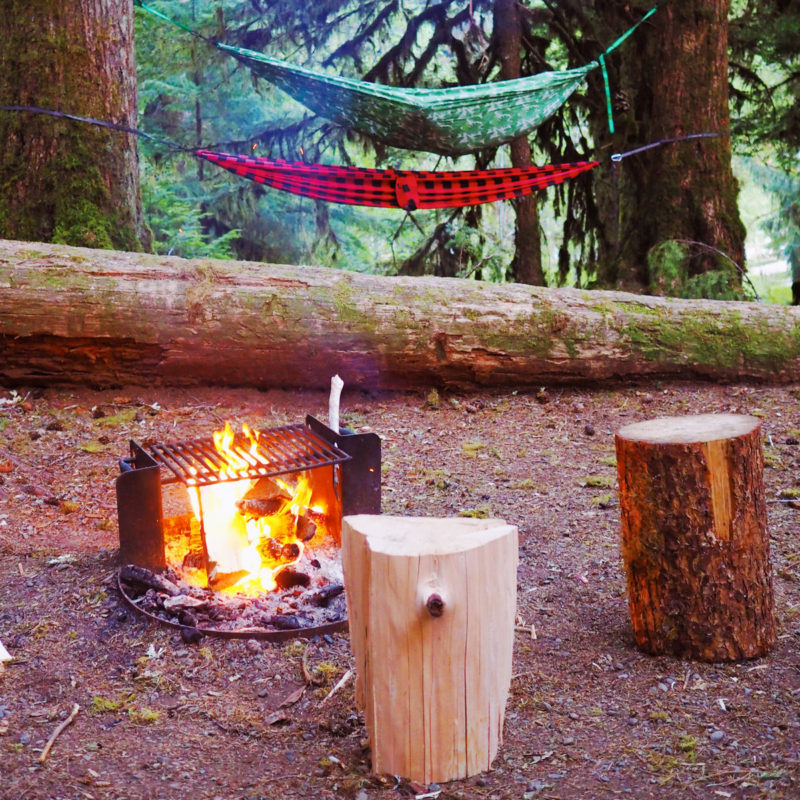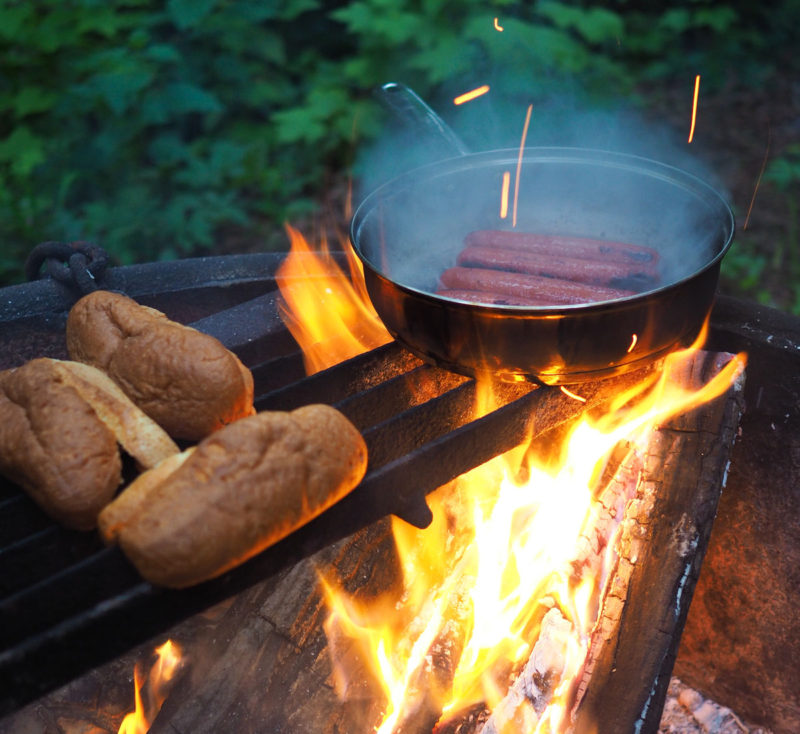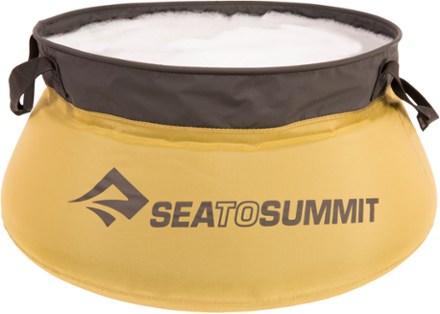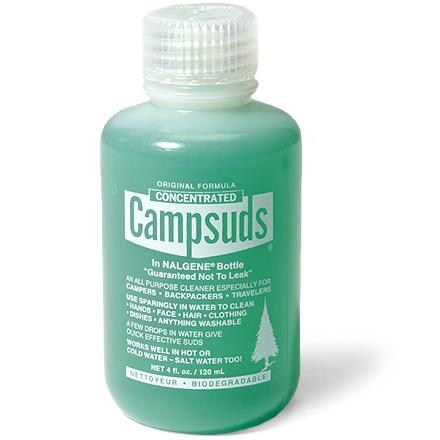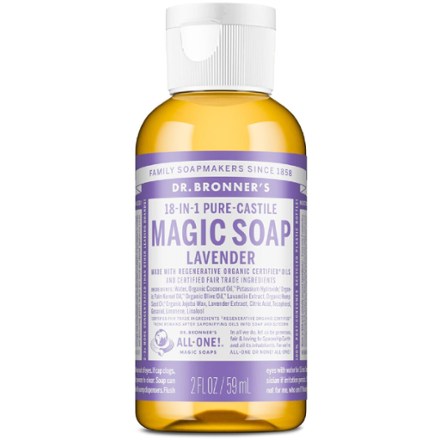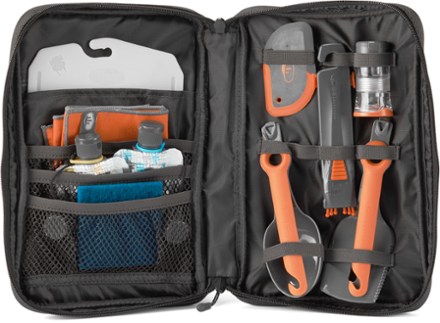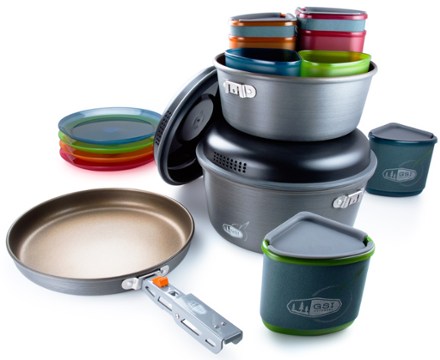 When you buy something using links in our stories, we may earn a small commission. Read more about our policy.
When you buy something using links in our stories, we may earn a small commission. Read more about our policy.
Camping is for essentialists. People who like going back to basics. You only have the bare necessities—gear, clothing, food, shelter—and you must survive. As it turns out, doing the dishes is one of life’s most basic chores. Not even camping lets you escape that reality.
Grab a small bucket/bin (aka your camp sink), fill it with warm water and the tiniest amount necessary of biodegradable soap, wet your sponge, dip your dishes, and get to work. Ideally you have a small towel and a buddy to help dry as everything is being washed, but you can also let the dishes sit on the towel—or picnic table or a nearby rock—to air dry. If dirt blows and sticks to the still-wet dishes, well, this is camping. That’s fine.
Now, it really is that simple, but of course we have a few expert tips and tricks to help before, during, and after chore time.
What you’ll need to wash dishes while camping
A few simple items will make camping dishwashing less terrible.
- A washbasin (aka camp sink). You can get away with one (for the soapy water and active washing), but two is preferred and easier for rinsing. There are collapsable camping sinks, which are perfect, as they fold down and take up less space when not in use. Or you can use a small plastic tub from home, which is nice because it can double as storage, especially if it has a lid. Don’t be so concerned about the dishes all fitting in the “sink.” Again, we’re camping. You don’t need to properly soak, you just need to get (most of) the dirt and grease off.
- Sponge/brush. A kitchen sponge from home with a scrub pad on one side will work just fine. If you’re concerned about weight/size (say, you’re backpacking or day hiking), cut the sponge in half. Here’s to embracing our inner-essentialist. Or, you may prefer a proper scrub brush to make your job a little easier.
- Biodegradable soap. This is very important. Unlike the sponge, do not bring the soap from your kitchen. It’s not intended to soak into the earth.
- Washcloth/dishtowel/quick-drying microfiber cloth. You can either set it and forget it, letting your dishes air dry on the clean towel, or dry as you go.
Where (and where not) to wash dishes when camping
The bathroom sink, even if it’s outside (NOT)
Most campground restrooms post signs that you cannot wash dishes in the sinks. The drains aren’t made for food waste, so please do not be tempted. If needed, take some of the water with you to wash, but do not do your dishes in these sinks or even nearby, as dirty water spills and contaminates.
Designated washing stations at the campground (NOT, really)
If you’re lucky enough to have a designated washing station and spigot with running water, you’ve hit the jackpot. It’s easier to fill up your sinks here, but again, you aren’t meant to actually wash here. Dirty water will inevitably spill into the ground. Unless there is proper drainage at the dishwashing station, which some do have, refrain from washing here. If there’s a proper drain, you’ve truly hit the jackpot.
At your campsite or anywhere away from water sources (BINGO)
Find a flat spot where you can hunker down and get to work.
How to wash dishes when camping
- Get rid of any remaining food on the plates, bowls, cups, utensils, etc. The cleaner the dishes are going into the sink, the better it is for your small amount of water. Scrape the dishes with a napkin or paper towel before washing. Hey, sometimes that’s all you need and washing isn’t necessary. You do you. You can also use a bit of fresh water to pre-rinse the dishes before hand washing. This usually gets rid of some excess bits, and it’s more environmentally friendly than a paper towel.
- Use warm/hot water. It’s temping to pour fresh water from your reserves or dip your sink into a nearby lake or river. As you well know, this won’t do a very good job cutting grease and removing grime. Use your camp stove, campfire, JetBoil, whatever to heat up some water for the dishes.
- Try to use as little soap as possible. This will likely end up back on the ground, so do earth a favor here. Check the bottle for instructions on how much to use, but make sure it’s no more than a few drops. Just enough to get a bit of suds going.
- Start with the cleanest dishes first to preserve the clean water as long as possible.
- Multi-sink method. Some people feel more comfortable with a second sink to rinse or even a third sink to sanitize the dishes. That’s cool. Do that. I never bother. After all, we’re camping. Rinse either in a second tub or hold the clean dish over your washbasin and drizzle some fresh water on it. Ideally you have some warm water to use, but even room temp won’t make a big difference here.
- Rinse your sponge well when you’re done using fresh water.
- Use a small rag to dry the dishes or let them air dry. A nice breeze and especially some sunshine will do the job for you in a matter of minutes. If you’re in a hurry, ask someone to dry as you wash. This will keep them from getting dirty again with bits blowing in the wind, too. Make sure everything is dry before storing to prevent bacteria growth, and then store everything as soon as it’s dry to keep it so fresh and so clean.
How to wash pots and pans
If you have a real nasty pot or pan after cooking, add a bit of hot water to it while you’re eating. It’s as simple as pouring some water in and letting it sit over the fire and marinate. This pre-soaking will work wonders when it comes time to scrub.
Also, don’t feel the need to put these big, dirty things into the sink. Bring the sink and just a bit of warm, soapy water to the pot/pan.
As for the bottom, don’t bother. If you cooked over an open flame, it will be covered in soot. Let it be. Have a designated bag for those extra dirty pots/pans, so it doesn’t get on the rest of the cookware or rub on other gear once it’s packed away. You can try cleaning it when you get home, if you’d like, but I leave my designated camp pots and pans in my camp kit, knowing that’s the only place it’ll get used.
Pro tip: Rub a little olive oil on the bottom of your pots and pans to help keep them clean(er) when cooking on an open flame. It helps the wood ash and soot from sticking. You can also add a bit of oil while you’re cooking to keep things from sticking inside the pots and pans.
Pro tip: Don’t burn your dinner. Burnt pans are more disgusting to clean than burnt food is to eat.
How to dispose of dirty dishwater when camping
Before you dump the grey water, get as much of the food scraps as you can out. This should go into the trash, not the ground. And not the fire pit.
Dirty dishwater is fine to be dumped on the ground, but try to disperse/spray it as much as possible. Don’t do it near your campsite, obviously, and make sure you’re about 100 feet from a water source. Earth drinks up whatever’s put into her, and you don’t want to contaminate fresh water sources. Try to find a sunny spot to help it evaporate quicker, and spray the dirty water over as much ground as you can. This helps minimize the impact as it soaks into the ground.
Things to think about
- Single-use dishes are not the answer. Doing the dishes isn’t fun, but it’s much better than using one-time-use paper plates or plastic silverware. You’re creating more waste, and it’s just unnecessary. Do your part, and do your chores. Earth thanks you.
- Cook only what you’ll eat. In the spirit of eliminating waste, don’t cook more than you and your crew are prepared to consume. This is common sense, and it also helps when it comes time to clean up. Also, leftovers are hard to store and preserve when you’re camping with limited accessories and storage.
- Perhaps consider going vegetarian while you’re camping. That’s hard for me to suggest, since I love hot dogs over an open flame more than life itself, not to mention bacon and eggs in the morning. BUT, it is true that meat smells odors (mmmm) attract more wild animals and create more grease than veggies, therefore making your dish duty a bit more difficult. So, maybe try cooking just veggies. No bears will bother you for your asparagus. And, if you can’t give it up, bring jerky, sliced salamis, or tuna. Me? I’ll be having bacon.
- Leave. No. Trace. Always follow the LNT principals when out in the wilderness. Make sure whatever you brought with you is going back with you.
Bon appétit!
Camp dishwashing gear
Sea to Summit Kitchen Sink
Available in three different sizes, this 10-liter collapsable sink is great for minimal storage and durable enough to withstand use in the outdoors.
UTS FlexWare Collapsible Sink
A 16-liter sink with a double handle for easy carrying and soft shell frame to pack down small for storage.
Campsuds Biodegradable Concentrated Soap
Use just a few drops of this concentrated soap to wash dishes—or yourself.
Dr. Bronner’s Organic Liquid Soap
A personal favorite, this soap is just a travel size but will last, since you only use a few drops. It’s made of all-natural ingredients and gentle on the environment, like all Dr. Bronner’s products.
REI Co-op Multi Towel
This magical towel absorbs 8 x its weight in water, and comes nearly dry when wrung out. It’s perfect for drying dishes and has an attached loop to hang up and air dry.
GSI Outdoors Gourmet Kitchen Set
This all-in-one kit has everything you need for your camp kitchen, including condiment containers, a cutting board, scubber and scraper, camp towel, spoon, spatula, and more. Complete with a nice carrying case so nothing gets lost.
GSI Outdoors Pinnacle Camper Cookset
Everything a family of four needs to cook and eat in the wild. This set has 4 plates, bowls, and mugs with sip lids, plus a 2-liter pot, 3-liter pot, frying pan, and most important, a pot gripper for getting things off the fire or stove safely.

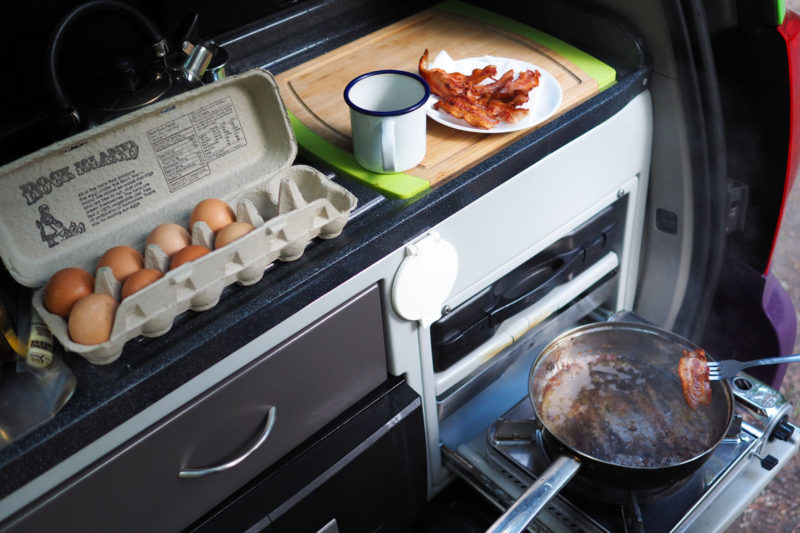 When you buy something using links in our stories, we may earn a small commission.
When you buy something using links in our stories, we may earn a small commission. 